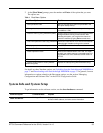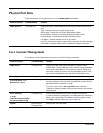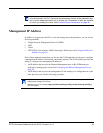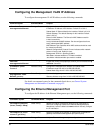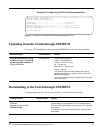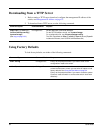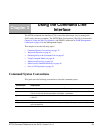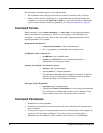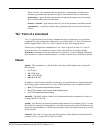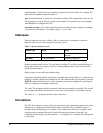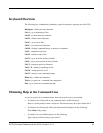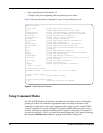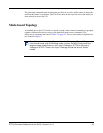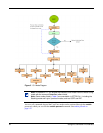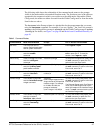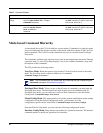
SFTOS Command Reference for the S2410, Version 2.4.1.0 41
Words in italics (also sometimes shown in brackets: <parameter>) indicate that a
mandatory parameter must be entered in place of the brackets and text inside them
.
[parameter]—square brackets indicate that an optional parameter may be entered in
place of the brackets and text inside them.
choice1 | choice2—pipe indicates that only one of the parameters should be entered.
{
parameter}—curly braces indicate that a parameter must be chosen from the list of
choices.
“No” Form of a Command
“No” is a specific form of an existing command and does not represent a new or distinct
command. Only the configuration commands are available in the “no” form. The behavior
and the support details of the “no” form is captured as part of the mapping sheets.
Almost every configuration command has a “no” form. In general, use the “no” form to
reverse the action of a command or reset a value to the default. For example, the
no
shutdown
command reverses the shutdown of an interface. Use the command without the
keyword
no to re-enable a disabled feature or to enable a feature that is disabled by default.
Values
ipaddr—This parameter is a valid IP address. Presently, the IP address can be entered in
these formats:
• a (32 bits)
• a.b (8.24 bits)
• a.b.c (8.8.16 bits)
• a.b.c.d (8.8.8.8)
In addition to these formats, decimal, hexadecimal, and octal formats are supported through
the following input formats (where n is any valid hexadecimal, octal, or decimal number):
• 0xn (CLI assumes hexadecimal format)
• 0n (CLI assumes octal format with leading zeros)
• n (CLI assumes decimal format)
macaddr—The MAC address format is six hexadecimal numbers separated by colons, for
example 00:06:29:32:81:40.
areaid—Area IDs may be entered in dotted-decimal notation (for example, 0.0.0.1). An area
ID of 0.0.0.0 is reserved for the backbone. Area IDs have the same form as IP addresses, but
are distinct from IP addresses. The IP network number of the sub-netted network may be used
for the area ID.
routerid—The value of <router id> must be entered in 4-digit dotted-decimal notation (for
example, 0.0.0.1). A router ID of 0.0.0.0 is invalid.



